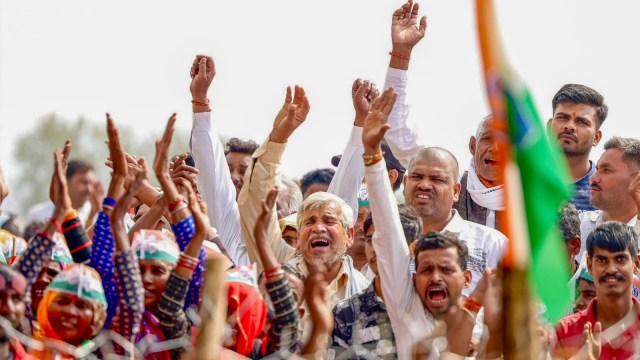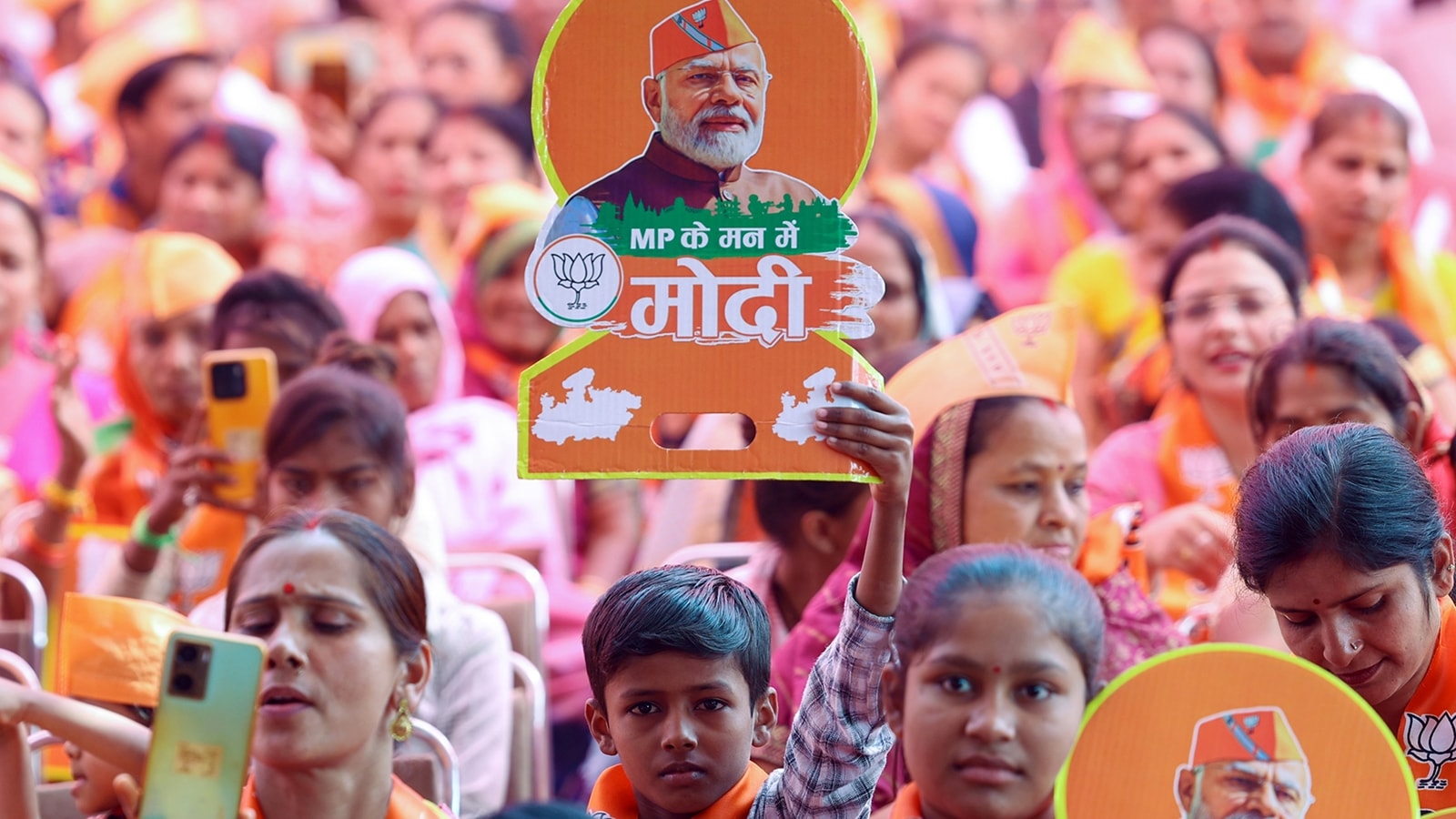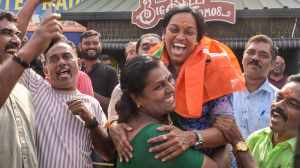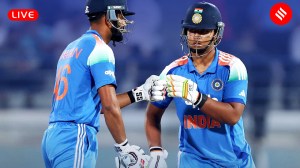Handout is fine but where’s the leg-up: Madhya Pradesh voter is asking for more
Modi’s ‘big-things’ appeal endures even as in state, mother to son, college girls to tribals, refrain is missing jobs and broken exams.
 At a Congress poll rally in Chitrakoot on Thursday. (PTI)
At a Congress poll rally in Chitrakoot on Thursday. (PTI) From Shivraj Singh Chouhan’s bastion in Sehore next to Bhopal to Congress’s chief ministerial candidate Kamal Nath’s home turf in Chhindwara, in conversations with voters you might sense a stirring.
After four terms in power, what the BJP is up against, and what the Congress hopes to become the receptacle for, is an anti-incumbency which includes the corruptions and mistakes of the government, boredom with a long-playing incumbent, a yearning for change — plus something more.
Amid a campaign that has become a barefaced battle of actual and pledged cash transfers, many even among BJP supporters, and especially among the young, are asking a larger and longer what-next question. What next after all these schemes? It’s a question that the Shivraj Singh Chouhan government does not seem either willing or equipped to answer.
The BJP is well-entrenched in MP because of the habits and excitements of Hindutva, and because in a state still shaking off the BIMARU tag, it is given credit by large sections for much of the basic work of “vikas”. Despite unevenness and corruption, it includes both the delivery of basic public goods like bijli-sadak-paani and a never-before profusion of here-and-now schemes that reach into individual households to deliver cash and subsidies.
 BJP supporters at a meeting by PM Narendra Modi in Satna, Madhya Pradesh. (ANI)
BJP supporters at a meeting by PM Narendra Modi in Satna, Madhya Pradesh. (ANI)
Many voters, especially among the rural poor, point to the free rations the government provided during the Covid lockdown as a reason to vote for continuity, not change. And yet, as the election draws closer, the government seems not to acknowledge or address the voter who wants more.
In an election being fought to the wire, after the 2018 face-off in which the Congress finished barely ahead by five seats (before defections by the Jyotiraditya Scindia group rearranged the numbers in the BJP’s favour), while the BJP remained slightly ahead in the percentage of votes – the Congress vote percentage, up by 4.60 per cent was 40.89 per cent, with the BJP, down by 3.86 per cent, at 41.02 per cent – manifestoes and posters on both sides are emblazoned with promises made in rupees. Rs 1,250 a month to women, in the Shivraj government’s most talked-about Ladli Behna scheme, will be raised to Rs 3,000, says the BJP, while the Congress promises cylinders for Rs 500 and a monthly assistance of Rs 1,500 to women among a host of other such promises and schemes.
Yet this election’s outcome could well be influenced by the questions about missing opportunities being asked by voters alienated by the state crudely playing Big Benefactor and tiring of their own dependence on in-your-face promises on poll-eve.
At Hamidia Arts and Commerce College in old Bhopal, that boasts among its alumni CM Chouhan, Sumit Singh, 19, a B.Com second-year student, describes a syndrome chronic across young voters: It stems from despair over the multiple entrance examination-admission-and-recruitment scams that contribute to the jobs crisis in MP. “This year it was the dhandhli (fraud) in the MP Patwari exam… This must change. The Congress could not hold on to their own MLAs the last time they came to power, what if their government falls again. So this election I will vote not for the party but for the individual candidate.”
It’s a repetitive cycle of vacancies being announced, and examinations held, only to be mired in allegations of paper leaks and manipulation of results, and stalled and stayed by litigation and controversy — the ghosts of the large-scale Vyapam recruitment scam that came to light in 2013 are yet to fade. The “patwari scam”, involving recruitment of revenue officials, in which several toppers allegedly appeared at the same examination centre located in a college run by a BJP MLA, is the latest in a dismal and apparently unending series.
At the Indian Coffee House, in Vijay Nagar in Indore, MP’s commercial hub and largest city, Meenal and Jyoti declare themselves to be “andh bhakt (blind followers)” of Modi – because “he thinks big” and because of “foreign policy”, “start-ups” and strides in “technology” – even as they talk of the toll taken in the state by delays in announcement of results for recruitments by the Madhya Pradesh Public Service Commission (MPPSC). “The result of the 2019 exam has still not been declared in 2023, we have been preparing for so long, these matters always end up in court,” Meenal says.
Jyoti talks about the Ladli Behna yojana that the BJP is single-mindedly projecting as the “turning point” that will help it race ahead of its rival on the back of the “women’s vote” in MP. “Aur tareeke ho sakte the (there could have been other ways) – skill development for instance. I don’t think this is good, seedhe seedhe paise dena (giving straight cash). Jeb mein paisa de dena welfare nahin hai (putting cash in pockets does not equal welfare)”.
And in the city’s Gujarati Girls College, Khyati Shukla, an MBA student who supports Modi at the Centre because of “continuing changes and connections with other countries”, says: “Mujhe aisa lag raha hai Mamaji munh par rishwat de rahe hain (I feel like Shivraj Chouhan is bribing me to my face)” in the state.
The Ladli Behna scheme is a telling case in point. It is popular but it also invites questions, by those who point to the cynicism of its poll-eve implementation, and by those who speak of the government giving with one hand and taking away with the other. Rising household electricity bills are frequently cited in urban areas, while farmers point to vaulting input costs and declining crop prices — so what is the benefit, they ask, and just how far can Rs 1,250 a month go in these times.
In Sehore, Mohammad Mohsin, a contractor, points to the steep rise in the price of the gas cylinder and says: “Ladli behna ko de raha hai, jeeja se le kar (government is taking away more and giving back a little to the same family)”.
But a more fundamental discomfort with the cash scheme sees it as a distraction and stand-in for the investment of energy and resources needed to open up and expand job opportunities. This discomfort is not confined to the relatively well-off or the upper castes alone.
In the tribal village of Bhagwanpura in district Khargone, many count out the government schemes they have benefited from – money for pucca houses to toilets to free rations to Ladli Behna and the Ujjwala subsidy – and some others talk of the improvement in roads and renovation of temples. But Pankaj Jadav, who is doing a BSc in nursing, and is forced to work in a shop because of “four years and no exam”, says that the uncertainty of job prospects is uppermost on his mind. “My mother has got Ladli Behna… But I want to study further and find a job”, he says.
In Chillar, a tribal village in Betul district, Gajraj, “12th pass”, says that he will vote for change. “Yojana toh chal rahi hai, par rozgar dena chahiye (we are getting the benefit of schemes, but we need employment)”.
In Chhindwara’s Rajmata Scindia Government Post Graduate College, Aradhana Baikar, a student who belongs to a Scheduled Caste, flags a problem unaddressed by a government that claims to speak especially to the women.
“Boys study and they are sent out of the state by their families to find jobs, but girls study and then are forced to sit at home.” What is needed is not cash transfers but “ek ek gaon mein ek ek company, jis mein ladies log kaam kar sakti hain (a company in every village that can give jobs to women),” she says.
On the street outside the college, Anju Ahirwal, who sells ready-made garments from a cart, says: “I don’t need Ladli Behna, I earn enough to eat everyday. But I don’t have the money to send my son to study outside Chhindwara. We need to build big colleges here, where we work and live”.
From Bhopal to Indore, and from Khargone to Chhindwara, many of the voters who express dissatisfaction with the cash-and-delivery model of the Shivraj Singh Government, express support for Modi at the Centre ahead of 2024. The reasons are different, but there are common themes: “Desh ka hit (for the good of the nation)”, “Hindutva ke liye” and because “abhi desh aage barh raha hai (the country is still moving ahead)”.
After two terms and despite the exclusions and discontents in a job-starved economy, the Modi appeal rests on the constant invocation of larger wholes, of nation and religion, the ideas of bigger and better, and the projection of a trajectory of progress. These may act as a salve for people with rising expectations and provide a cushion for a government.
At the state level in MP, then, apart from a genuine lack of structural and systemic changes and progress on the jobs front, it is the absence of the government’s framing of and voter buy-in to bigger ideas, next steps and future goals that may now be coming to bite the BJP.
- 01
- 02
- 03
- 04
- 05































